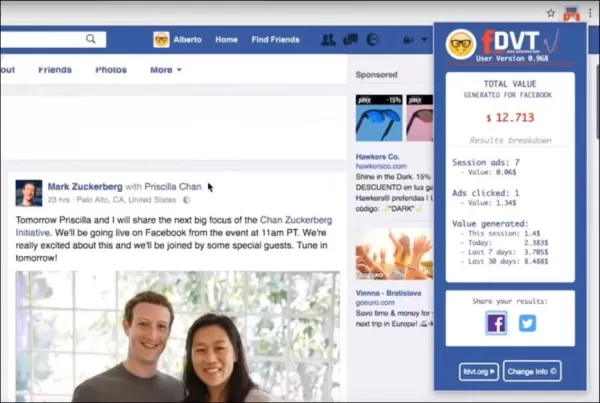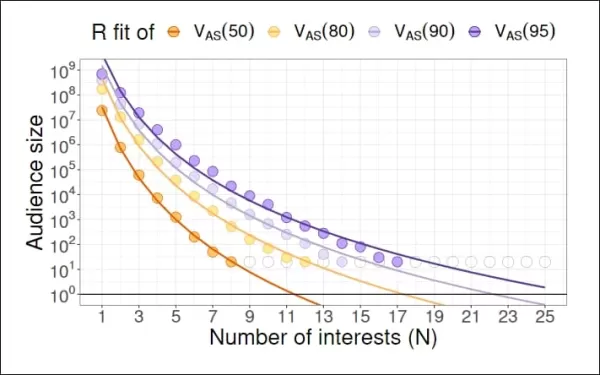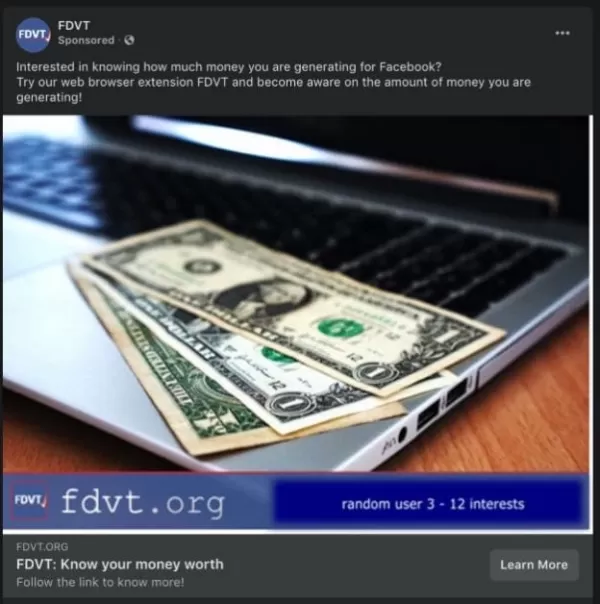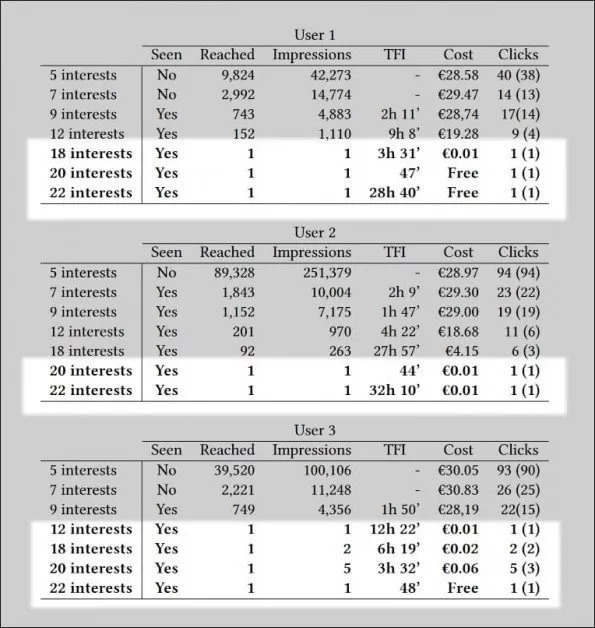Facebook: ‘Nanotargeting’ Users Based Solely on Their Perceived Interests
Imagine being able to target a single individual out of 1.5 billion Facebook users with an ad campaign, and doing so without relying on personal information like email addresses or phone numbers. That's exactly what researchers have managed to do, using only the user's interests, which are determined by their interactions on the platform. It's a fascinating yet somewhat unsettling development in the world of digital advertising.
These interests, which users can't fully control, are pieced together from what you 'like', the content you engage with, and your browsing habits. The twist? You don't need to explicitly mention your interests anywhere on your profile for this to work. This means you could be the sole target of an ad campaign without even realizing how it happened, despite any privacy measures you might take.
What's more, this 'nanotargeting' isn't just possible; it's affordable, and sometimes even free. Facebook might not charge for campaigns that only reach one person, making this tactic surprisingly cost-effective for advertisers.
High Interest Rates
The researchers behind this study tested their theory on themselves, creating a campaign designed to target them out of a pool of 1.5 billion users. They used a mix of randomly selected interests, and the ads hit their mark when more of these interests matched. Their findings suggest that with just the four rarest interests of a user, you can pinpoint them with 90% accuracy. If you go with 22 randomly chosen interests, you're still looking at a 90% chance of hitting the right person.
This method of pinpointing individuals with supposedly anonymous data is just the beginning, the researchers warn. It could undo much of the work done to protect privacy after scandals like Cambridge Analytica.
The study, titled Unique on Facebook: Formulation and Evidence of (Nano)targeting Individual Users with non-PII Data, was a joint effort by researchers from the Universidad Carlos III de Madrid, GTD System & Software Engineering, and Graz University of Technology in Austria.
Methodology
The research used data collected in January 2017. Since then, Facebook has upped the minimum audience size for ad campaigns from 20 to 1000 users. However, this change doesn't prevent targeting smaller groups; it just hides the actual size of the audience from advertisers. The researchers point out that this limit can be worked around, and they've shown it's possible to target even smaller groups.
The dataset was gathered from 2,390 volunteers who used the FDVT browser extension before January 2017. This tool gives users a real-time estimate of how much revenue their browsing generates for Facebook, based on the data they agree to share with the researchers.
From this, the researchers gathered 1.5 million data points and identified 99,000 unique interests, with participants having a median of 426 interests. They then worked out a formula to determine the minimum number of interests needed for nanotargeting, finding that just four 'marginal' interests can do the trick, with accuracy increasing as interests get more specific.
When it comes to 'random interests', they calculated that 12, 18, 22, and 27 interests give you a 50%, 80%, 90%, and 95% chance, respectively, of targeting a unique user.
 The FDVT browser extension provided by the researchers gives the logged-in Facebook user a stream of information about the privacy aspects and profitability (for Facebook) of the user's browsing activities. Source: YouTube
The FDVT browser extension provided by the researchers gives the logged-in Facebook user a stream of information about the privacy aspects and profitability (for Facebook) of the user's browsing activities. Source: YouTube
Nanotargeting Test
The authors set up ad campaigns targeting themselves using random interest sets provided by Facebook's ad system. They chose this approach to demonstrate the broad applicability of their findings, rather than focusing on highly specific interests.
 Results from the researchers' model, computing the number of interests necessary to individuate a user under various constraints. Source: arXiv
Results from the researchers' model, computing the number of interests necessary to individuate a user under various constraints. Source: arXiv
Out of 21 campaigns run, nine successfully nanotargeted the intended recipient, with success rates improving as more interests were used. The cost? Surprisingly low at just 0.12€ across all successful campaigns, and in three cases, Facebook didn't charge anything at all for ads that only reached one person.
 In the bottom right corner, the number of interests powering the ad are displayed within the FDVT interface.
In the bottom right corner, the number of interests powering the ad are displayed within the FDVT interface.
 Results of the nanotargeting experiment for the three contributing authors of the paper, all of whom exclusively received at least two nanotargeted ads. Multiple impressions for a successful nanotargeting are the result of the ad being shown multiple times to the target across page impressions, and not an indication that anyone else saw the ad.
Results of the nanotargeting experiment for the three contributing authors of the paper, all of whom exclusively received at least two nanotargeted ads. Multiple impressions for a successful nanotargeting are the result of the ad being shown multiple times to the target across page impressions, and not an indication that anyone else saw the ad.
Skirting Facebook 'Protections'
Facebook has rules in place to prevent targeting individual users directly, like minimum list sizes for campaigns. But these can be easily bypassed. For example, a CEO once used this to target a single potential employee by including him in a list of 30 people, cleverly meeting the platform's criteria.
The researchers argue that despite updates to these policies, enforcement is spotty. They note that even though Facebook upped the minimum audience size to 20, their research shows this limit isn't always enforced.
False Impressions
Beyond privacy concerns, nanotargeting challenges the idea that advertising is a shared experience. It's been used deceptively, like when UK Labour politician Jeremy Corbyn's campaign was directed only at him and a few others, unbeknownst to the general public.
The researchers warn that nanotargeting could be used to manipulate individuals, create false perceptions, or even for more sinister purposes like blackmail. They stress that their work only scratches the surface of how non-PII data can be used for such targeting, hinting at the potential for even more invasive tactics using additional demographic data.
 FDVT: Data Valuation Tool for Facebook Users
FDVT: Data Valuation Tool for Facebook Users
Watch this video on YouTube
Related article
 Google Cloud Powers Breakthroughs in Scientific Research and Discovery
The digital revolution is transforming scientific methodologies through unprecedented computational capabilities. Cutting-edge technologies now augment both theoretical frameworks and laboratory experiments, propelling breakthroughs across discipline
Google Cloud Powers Breakthroughs in Scientific Research and Discovery
The digital revolution is transforming scientific methodologies through unprecedented computational capabilities. Cutting-edge technologies now augment both theoretical frameworks and laboratory experiments, propelling breakthroughs across discipline
 AI Accelerates Scientific Research for Greater Real-World Impact
Google has consistently harnessed AI as a catalyst for scientific progress, with today's pace of discovery reaching extraordinary new levels. This acceleration has transformed the research cycle, turning fundamental breakthroughs into practical appli
AI Accelerates Scientific Research for Greater Real-World Impact
Google has consistently harnessed AI as a catalyst for scientific progress, with today's pace of discovery reaching extraordinary new levels. This acceleration has transformed the research cycle, turning fundamental breakthroughs into practical appli
 Ethics in AI: Tackling Bias and Compliance Challenges in Automation
As automation becomes deeply embedded across industries, ethical considerations are emerging as critical priorities. Decision-making algorithms now influence crucial aspects of society including employment opportunities, financial services, medical c
Comments (28)
0/200
Ethics in AI: Tackling Bias and Compliance Challenges in Automation
As automation becomes deeply embedded across industries, ethical considerations are emerging as critical priorities. Decision-making algorithms now influence crucial aspects of society including employment opportunities, financial services, medical c
Comments (28)
0/200
![PaulMartinez]() PaulMartinez
PaulMartinez
 August 24, 2025 at 5:01:17 AM EDT
August 24, 2025 at 5:01:17 AM EDT
This nanotargeting thing on Facebook is wild! 🧠 Just using interests to pinpoint one person out of billions? That’s some sci-fi level ad tech. Kinda cool, but also creepy—imagine ads chasing you like a laser-guided missile!


 0
0
![FrankJohnson]() FrankJohnson
FrankJohnson
 August 20, 2025 at 9:01:18 AM EDT
August 20, 2025 at 9:01:18 AM EDT
This nanotargeting stuff is wild! 😲 It’s like Facebook’s playing laser tag with our interests. Kinda creepy how precise it can get, but I bet marketers are drooling over this tech.


 0
0
![AlbertDavis]() AlbertDavis
AlbertDavis
 July 31, 2025 at 10:48:18 PM EDT
July 31, 2025 at 10:48:18 PM EDT
This nanotargeting stuff is wild! 😮 Imagine ads chasing you down just because you liked a few cat videos. Kinda creepy, but I bet marketers are drooling over this precision. Wonder how far this tech will go before it feels like mind-reading?


 0
0
![EricNelson]() EricNelson
EricNelson
 April 23, 2025 at 4:00:13 AM EDT
April 23, 2025 at 4:00:13 AM EDT
O nanotargeting do Facebook é louco! É incrível pensar que eles podem me atingir com anúncios baseados apenas nos meus interesses. É um pouco assustador, mas também legal. Me pergunto o quão preciso isso realmente é, no entanto? 🤔 Talvez eles deveriam nos permitir optar por sair dessas coisas super direcionadas.


 0
0
![RalphGarcia]() RalphGarcia
RalphGarcia
 April 18, 2025 at 6:30:25 AM EDT
April 18, 2025 at 6:30:25 AM EDT
Facebookのナノターゲティングは驚きです!私の興味だけで広告をピンポイントで当ててくるなんて、ちょっと怖いけど面白いですね。本当にどれだけ正確なのか気になります🤔。この超ターゲティングからオプトアウトできるようにしてほしいですね。


 0
0
![GaryWilson]() GaryWilson
GaryWilson
 April 17, 2025 at 5:43:07 PM EDT
April 17, 2025 at 5:43:07 PM EDT
페이스북의 나노타겟팅은 섬뜩하지만 흥미롭네요. 제 관심사만으로 저를 이렇게 정확하게 타겟팅할 수 있다니 대단해요. 하지만 약간 침입적인 느낌도 들어요. 광고의 미래일지 모르지만, 아직 완전히 동의할 수는 없어요. 🤔👀


 0
0
Imagine being able to target a single individual out of 1.5 billion Facebook users with an ad campaign, and doing so without relying on personal information like email addresses or phone numbers. That's exactly what researchers have managed to do, using only the user's interests, which are determined by their interactions on the platform. It's a fascinating yet somewhat unsettling development in the world of digital advertising.
These interests, which users can't fully control, are pieced together from what you 'like', the content you engage with, and your browsing habits. The twist? You don't need to explicitly mention your interests anywhere on your profile for this to work. This means you could be the sole target of an ad campaign without even realizing how it happened, despite any privacy measures you might take.
What's more, this 'nanotargeting' isn't just possible; it's affordable, and sometimes even free. Facebook might not charge for campaigns that only reach one person, making this tactic surprisingly cost-effective for advertisers.
High Interest Rates
The researchers behind this study tested their theory on themselves, creating a campaign designed to target them out of a pool of 1.5 billion users. They used a mix of randomly selected interests, and the ads hit their mark when more of these interests matched. Their findings suggest that with just the four rarest interests of a user, you can pinpoint them with 90% accuracy. If you go with 22 randomly chosen interests, you're still looking at a 90% chance of hitting the right person.
This method of pinpointing individuals with supposedly anonymous data is just the beginning, the researchers warn. It could undo much of the work done to protect privacy after scandals like Cambridge Analytica.
The study, titled Unique on Facebook: Formulation and Evidence of (Nano)targeting Individual Users with non-PII Data, was a joint effort by researchers from the Universidad Carlos III de Madrid, GTD System & Software Engineering, and Graz University of Technology in Austria.
Methodology
The research used data collected in January 2017. Since then, Facebook has upped the minimum audience size for ad campaigns from 20 to 1000 users. However, this change doesn't prevent targeting smaller groups; it just hides the actual size of the audience from advertisers. The researchers point out that this limit can be worked around, and they've shown it's possible to target even smaller groups.
The dataset was gathered from 2,390 volunteers who used the FDVT browser extension before January 2017. This tool gives users a real-time estimate of how much revenue their browsing generates for Facebook, based on the data they agree to share with the researchers.
From this, the researchers gathered 1.5 million data points and identified 99,000 unique interests, with participants having a median of 426 interests. They then worked out a formula to determine the minimum number of interests needed for nanotargeting, finding that just four 'marginal' interests can do the trick, with accuracy increasing as interests get more specific.
When it comes to 'random interests', they calculated that 12, 18, 22, and 27 interests give you a 50%, 80%, 90%, and 95% chance, respectively, of targeting a unique user.
 The FDVT browser extension provided by the researchers gives the logged-in Facebook user a stream of information about the privacy aspects and profitability (for Facebook) of the user's browsing activities. Source: YouTube
The FDVT browser extension provided by the researchers gives the logged-in Facebook user a stream of information about the privacy aspects and profitability (for Facebook) of the user's browsing activities. Source: YouTube
Nanotargeting Test
The authors set up ad campaigns targeting themselves using random interest sets provided by Facebook's ad system. They chose this approach to demonstrate the broad applicability of their findings, rather than focusing on highly specific interests.
 Results from the researchers' model, computing the number of interests necessary to individuate a user under various constraints. Source: arXiv
Results from the researchers' model, computing the number of interests necessary to individuate a user under various constraints. Source: arXiv
Out of 21 campaigns run, nine successfully nanotargeted the intended recipient, with success rates improving as more interests were used. The cost? Surprisingly low at just 0.12€ across all successful campaigns, and in three cases, Facebook didn't charge anything at all for ads that only reached one person.
 In the bottom right corner, the number of interests powering the ad are displayed within the FDVT interface.
In the bottom right corner, the number of interests powering the ad are displayed within the FDVT interface.
 Results of the nanotargeting experiment for the three contributing authors of the paper, all of whom exclusively received at least two nanotargeted ads. Multiple impressions for a successful nanotargeting are the result of the ad being shown multiple times to the target across page impressions, and not an indication that anyone else saw the ad.
Results of the nanotargeting experiment for the three contributing authors of the paper, all of whom exclusively received at least two nanotargeted ads. Multiple impressions for a successful nanotargeting are the result of the ad being shown multiple times to the target across page impressions, and not an indication that anyone else saw the ad.
Skirting Facebook 'Protections'
Facebook has rules in place to prevent targeting individual users directly, like minimum list sizes for campaigns. But these can be easily bypassed. For example, a CEO once used this to target a single potential employee by including him in a list of 30 people, cleverly meeting the platform's criteria.
The researchers argue that despite updates to these policies, enforcement is spotty. They note that even though Facebook upped the minimum audience size to 20, their research shows this limit isn't always enforced.
False Impressions
Beyond privacy concerns, nanotargeting challenges the idea that advertising is a shared experience. It's been used deceptively, like when UK Labour politician Jeremy Corbyn's campaign was directed only at him and a few others, unbeknownst to the general public.
The researchers warn that nanotargeting could be used to manipulate individuals, create false perceptions, or even for more sinister purposes like blackmail. They stress that their work only scratches the surface of how non-PII data can be used for such targeting, hinting at the potential for even more invasive tactics using additional demographic data.
 FDVT: Data Valuation Tool for Facebook Users
FDVT: Data Valuation Tool for Facebook Users
Watch this video on YouTube
 Google Cloud Powers Breakthroughs in Scientific Research and Discovery
The digital revolution is transforming scientific methodologies through unprecedented computational capabilities. Cutting-edge technologies now augment both theoretical frameworks and laboratory experiments, propelling breakthroughs across discipline
Google Cloud Powers Breakthroughs in Scientific Research and Discovery
The digital revolution is transforming scientific methodologies through unprecedented computational capabilities. Cutting-edge technologies now augment both theoretical frameworks and laboratory experiments, propelling breakthroughs across discipline
 AI Accelerates Scientific Research for Greater Real-World Impact
Google has consistently harnessed AI as a catalyst for scientific progress, with today's pace of discovery reaching extraordinary new levels. This acceleration has transformed the research cycle, turning fundamental breakthroughs into practical appli
AI Accelerates Scientific Research for Greater Real-World Impact
Google has consistently harnessed AI as a catalyst for scientific progress, with today's pace of discovery reaching extraordinary new levels. This acceleration has transformed the research cycle, turning fundamental breakthroughs into practical appli
 August 24, 2025 at 5:01:17 AM EDT
August 24, 2025 at 5:01:17 AM EDT
This nanotargeting thing on Facebook is wild! 🧠 Just using interests to pinpoint one person out of billions? That’s some sci-fi level ad tech. Kinda cool, but also creepy—imagine ads chasing you like a laser-guided missile!


 0
0
 August 20, 2025 at 9:01:18 AM EDT
August 20, 2025 at 9:01:18 AM EDT
This nanotargeting stuff is wild! 😲 It’s like Facebook’s playing laser tag with our interests. Kinda creepy how precise it can get, but I bet marketers are drooling over this tech.


 0
0
 July 31, 2025 at 10:48:18 PM EDT
July 31, 2025 at 10:48:18 PM EDT
This nanotargeting stuff is wild! 😮 Imagine ads chasing you down just because you liked a few cat videos. Kinda creepy, but I bet marketers are drooling over this precision. Wonder how far this tech will go before it feels like mind-reading?


 0
0
 April 23, 2025 at 4:00:13 AM EDT
April 23, 2025 at 4:00:13 AM EDT
O nanotargeting do Facebook é louco! É incrível pensar que eles podem me atingir com anúncios baseados apenas nos meus interesses. É um pouco assustador, mas também legal. Me pergunto o quão preciso isso realmente é, no entanto? 🤔 Talvez eles deveriam nos permitir optar por sair dessas coisas super direcionadas.


 0
0
 April 18, 2025 at 6:30:25 AM EDT
April 18, 2025 at 6:30:25 AM EDT
Facebookのナノターゲティングは驚きです!私の興味だけで広告をピンポイントで当ててくるなんて、ちょっと怖いけど面白いですね。本当にどれだけ正確なのか気になります🤔。この超ターゲティングからオプトアウトできるようにしてほしいですね。


 0
0
 April 17, 2025 at 5:43:07 PM EDT
April 17, 2025 at 5:43:07 PM EDT
페이스북의 나노타겟팅은 섬뜩하지만 흥미롭네요. 제 관심사만으로 저를 이렇게 정확하게 타겟팅할 수 있다니 대단해요. 하지만 약간 침입적인 느낌도 들어요. 광고의 미래일지 모르지만, 아직 완전히 동의할 수는 없어요. 🤔👀


 0
0





























